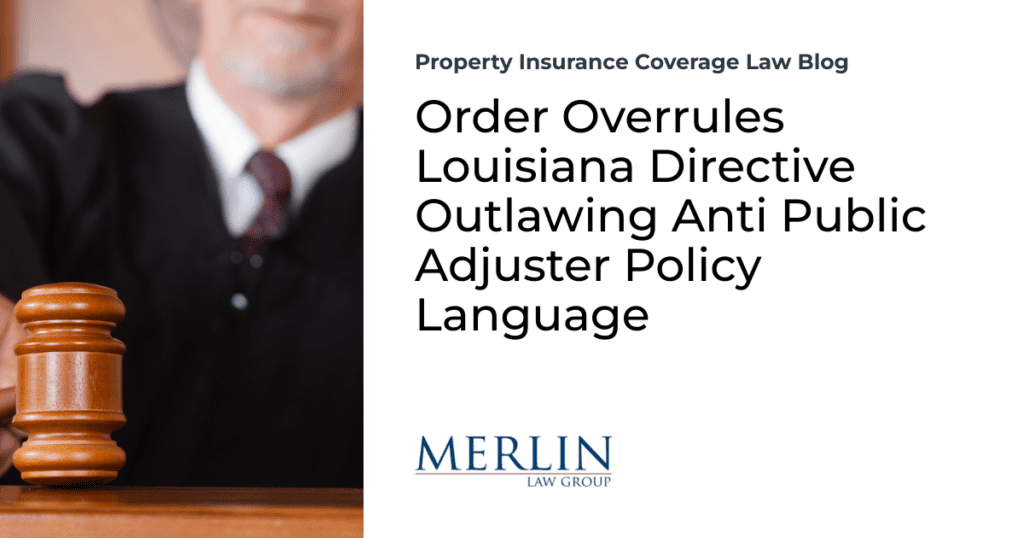Order Overrules Louisiana Directive Outlawing Anti Public Adjuster Policy Language

One of the interesting aspects of my professional life is receiving information from readers of this blog, who alert me to new matters and changes to old matters. The texts, emails, and phone calls I receive are from folks who work with policyholders, insurers, and even capable insurance defense attorneys whom we fight in courtrooms throughout the country. I appreciate this and try to share much of this with you.
In response to my recent post, Anti-Public Adjuster Endorsements—NAPIA Takes a Leadership Stance Against the Insurance Industry Trying to Eliminate Public Adjusting, and an old post, Insurance Companies Prohibited From Placing Anti Public Adjuster Language in Property Policies, we received yesterday an Administrative Order that overruled the Louisiana Insurance Commissioner’s directive prohibiting Anti Public Adjuster language in Louisiana property insurance policies.
The Order immediately set forth the ruling:
On January 24, 2022, the Louisiana Commissioner of Insurance, James J. Donelon
(Commissioner) issued Directive 219 (Directive), requiring all authorized insurers and surplus lines insurers to comply with Louisiana Revised Statutes (La. R.S.) 22:1704(E)(2). The Directive also further ordered insurers to review all policy forms and endorsements to ensure compliance with La. R.S. 22: 1704(E)(2).
Velocity Risk Underwriters, LLC appealed the legal validity of the Directive. Based on the following, Directive 219 is not legally valid.
The Order provided the basis for its reasoning and stated in part:
On January 24, 2022, the Commissioner issued Directive 219, wherein he interpreted La. R.S. 22: 1704(E)(2) to mean that insureds have the right to hire a public adjuster to help meet obligations under their insurance policy.
LDI alleged that the basis for issuing the Directive was because some insurers were attempting to prohibit the use of public adjusters in their policy provisions in direct contravention to La. R.S. 22:1704(E)(2). The Commissioner stated in the directive that the anti-public adjuster clauses attempt to prohibit insureds from hiring, engaging, retaining, or utilizing the services of a public adjuster. The Commissioner determined that the prohibitions against public adjusters in insurance contracts directly contradict La. R.S. 22: 1704(E)(2).
…
Directive 219 is not legally valid because it is based on an incorrect interpretation of Louisiana Revised Statutes. The Directive requires insurers to comply with La. R.S.
22:1704(E)(2), a statute that governs contracts between public adjusters and insureds. The Directive interprets La. R.S. 22:1704(E)(2) to provide a mandatory right to insureds to hire a public adjuster. The Directive ambiguously forbids insurers from using anti-public adjuster clauses in their insurance contracts.
…
For the sake of argument, if La. R.S. 22:1704(E)(2) was intended to give all insureds a general right to hire a public adjuster in all circumstances, there is no language in the statute that forbids the insured from waiving that right in an insurance contract in the hopes of obtaining a cheaper premium by abandoning the right to a public adjuster. The Commissioner does not have authority to create a stricter more absolute standard than the legislature used in La. R.S. 22: 1704(E)(2), which simply states that the insured is not required to hire a public adjuster, but the insured has a right to do so. LDI did not cite any statute, promulgated rule or regulation that grants an insured an inalienable right to a public adjuster in an insurance contract.
The Order criticized the Louisiana Insurance Commissioner for not following rules required to make the administrative directive:
Directive 219 was issued without the formalities necessary for the establishment of a rule or regulation. A directive cannot be used to create mandatory prohibitions beyond statutory authority. LDI did not cite any other statute as its basis for Directive 219, nor did it list any other source of authority for the Directive. LDI’s legal basis supporting Directive 219 is “clearly wrong.” Therefore, Directive 219 is legally invalid.
I am not an administrative attorney, but the tone of the Order would make me say “ouch” if I was counsel for the Louisiana Insurance Commissioner.
So, what does this mean? It means that there is no Directive, and that Louisiana does not administratively proscribe anti-public adjuster language within insurance policies.
It does not mean that these are legal and does not subject insurers to various anti-trust claims. It does not mean that these clauses are valid. Those legal fights are just in the beginning formative stages.
I left California and a very successful CAPIA meeting and am now in Austin, Texas. I will be reporting on my panel discussion with Rene Sigman and Steve Badger tomorrow.
I appreciate the notes about our settlement in a Texas matter noted in Law360 yesterday. But I cannot comment on it. If you have information or comments you would like to share on any other matter, please do not hesitate to do so. They often end up in a future post, and I sincerely appreciate everybody’s help and views.
Thought For The Day
Anybody who succeeds is helping people. The secret to success is find a need and fill it; find a hurt and heal it; find a problem and solve it.
—Rober H. Schuller



